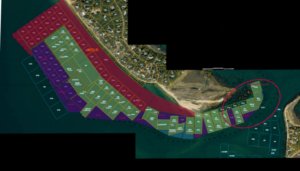WELLFLEET — The select board imposed a temporary moratorium on aquaculture grants on town-owned flats off Indian Neck on Aug. 16, pending a review by the town’s shellfish advisory board. The select board required that the review include input from upland property owners, the marina advisory committee, and the natural resources advisory board.
The moratorium affects about 26.2 acres of unproductive bottom that could potentially be developed into new grants. That area is slightly more than one-tenth of the whole town-owned tract of 254.5 acres.
The select board added a provision that 20 of the 26.2 acres would be made available first to five grant holders who currently operate in deep water outside the town-owned flats.
Monday’s hearing, held remotely, was the town’s first stab at making policy on the tidelands since town meeting voters agreed to buy them in April 2019. The property contains a mix of wild shellfishing area, beach, wetlands, and one-third of the cultivated shellfish grants in Wellfleet.
It is rare for a town to buy land for aquaculture, said Ed Englander, the attorney who represented the four businessmen of the How Do You Like Them Apples (HDYLTA) Realty Trust who sold the tract to the town for $2 million. They had bought the flats in 1999 for $25,000.

The town’s purchase was even more unusual because half the money came from a select board member, Helen Miranda Wilson, who anonymously donated $1 million to help seal the deal; taxpayers provided the other $1 million. A public records request by the Provincetown Banner led to Wilson being identified as the donor.
Wilson, an artist who has never held a shellfishing grant, said she derived no financial benefit from the transaction but simply wanted to help the shellfish industry and protect the flats from deep-pocketed buyers.
Following the controversial purchase, town officials took no action until Shellfish Constable Nancy Civetta and Harbormaster Will Sullivan wrote a letter to the select board in April, asking for a public forum to begin planning the future use of the flats.
“We think that we should take a step back as a community and look at the question of what to do with and how to best use the HDYLTA Trust property,” wrote Sullivan and Civetta. “A holistic planning for the area seems warranted in order to bring people together to consider the effects of expanded aquaculture on other harbor users.”
During the Aug. 16 meeting, it was clear that nearby upland property owners are bothered by shellfish trucks on their beaches. Boaters said the Blackfish Creek channel is crowded with shellfish gear and difficult to navigate.
The select board’s decision to impose the moratorium specified that home owners on Field Point and King Philip Road must be included among those consulted on recommendations for use of the flats.
Select board chair Ryan Curley said the five three-acre grant holders who currently operate in deep water are having trouble making their grants profitable. They are Robert and Allison Paine, Dave Seitler and Melissa Yow, the shellfish seed hatchery A.R.C. in Dennis, William “Chopper” Young, and Justin Lynch and Eben Kenny. The area is accessible only on foot at extreme low tides.
The HDYLTA flats include 20.5 acres next to these deep-water grants. If the land is unproductive — that is, not suitable for wild shellfish harvesting — it is eligible to become private grants. That determination must be made by the U.S. Army Corps of Engineers and the state Div. of Marine Fisheries.
Seitler said he did not attend the Aug. 16 meeting but was pleased with the offer to move his grant toward shallower water.
“It would be helpful for me; it would be helpful for the town,” said Seitler. “It seems like a win-win for everybody.” Right now, the former HDYLTA grants in Seitler’s area create what he calls a “random alleyway that nobody can use.”
Civetta said “there is a general consensus” that moving those grants landward into HDYLTA territory would be worthwhile. The deep-water grants would then be turned back to the wild, though that was not part of the select board’s formal vote.
Sullivan, the harbormaster, said returning the deep-water grants to the wild would improve navigation in “that whole stretch of land.”
Curley said he used to be able to tack in his sailboat in Blackfish Creek, but now it is too crowded with shellfish gear on either side.
Anne Sterling, president of the Field Point Property Owners Association, asked that any planning committee include residents of that area who maintain the access roads.
“There is concern about stability of the beach with all the trucks on it,” she said. “So, more grants would bring more trucks.”
Civetta said planning a few new grants on HDYLTA should be fine.
“Wellfleet has been under aquaculture for decades,” she said, “and we don’t have real problems in my eyes. I don’t think this should be a problem — to allow some newcomers to the industry.”
Reporter Alex Sharp contributed to this article.



